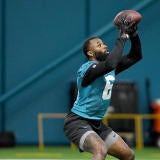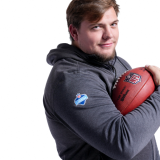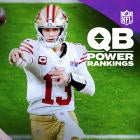After documents surfaced recently that Giants kicker Josh Brown admitted he had been "physically, emotionally and mentally" abusive to his now ex-wife, the team finally placed him on the commissioner's exempt list. Days later, Brown, whose NFL career may be over, released a statement:
I am sorry that my past has called into question the character or integrity of The New York Giants, Mr. Mara or any of those who have supported me along the way. I have taken measures to get help so that I may be the voice of change, not a statistic. It is important to share that I never struck my wife, and never would. Abuse takes many forms, and is not a gray area. Through the past several years I have worked to identify and rectify my own behaviors. The road to rehabilitation is a journey and a constant modification of a way of life. My journey will continue forever as a person determined to leave a positive legacy and I embrace the opportunities to show and speak about what has helped me to be that man. In the interim, I am cooperating with the Giants and the NFL. Thank you to everyone that has supported me, I will not let you down.
-Josh Brown
In January, newly hired Giants coach Ben McAdoo said that domestic violence is something he "won't tolerate as a head coach." By August, when asked about the team's investigation into the matter, he said, "I stay in my lane." And last weekend from London, McAdoo offered this: "We're not going to turn our back on Josh. He's a teammate. He's a guy that we're hoping makes strides."
Meanwhile, in August, Giants general manager Jerry Reese signed Brown to a two-year deal, after learning of the kicker's arrest. And at the time, team president and CEO John Mara maintained that the organization was "comfortable" retaining Brown.
"When we made the decision to re-sign Josh back in (2016), we were certainly aware of the arrest," Mara said in late August. "We were also aware of the allegations associated with that arrest and the fact that the charges were dropped within a couple of days after the arrest. Based on the facts and circumstances that we were aware of at that time, we were comfortable with our decision to re-sign him. Nothing has happened in the meantime to make us question that decision. This is an issue, domestic violence, that we take very seriously here."
Commissioner Roger Goodell has also come under fire, particularly in light of how poorly the league handled the Ray Rice scandal in 2014. It led to a new domestic-violence policy that included stiffer penalties, at least on paper. Here's what Goodell wrote in a letter to owners in August 2014:
"Effective immediately, violations of the Personal Conduct Policy regarding assault, battery, domestic violence or sexual assault that involve physical force, will be subject to a suspension without pay of six games for a first offense, with consideration given to mitigating factors as well as a longer suspension when circumstances warrant."
Josh Brown was suspended for just one game before we learned that he admitted to being abusive to his wife. At the time, the kicker wasn't happy he was being suspended.
"While I do not agree with the suspension, I will accept it," Brown said in August. "I have exhausted the appeals process and have no other options along those lines. I will continue to work hard for this team, and I have tremendous confidence in my teammates and in my ability to move on and contribute to the team."
Here's how Goodell rationalized the punishment when asked about it last weekend.
"Well, you have to go and get the facts," Goodell told the BBC's Richard Conway while in London. "We have asked repeatedly for those facts and the information that's been gathered by law enforcement both orally and in writing. And we weren't able to get access to it. So you have to make decisions on whatever information you have."
Later in the interview, Conway asked this: "The criticism that comes back to you is that people see punishments for touchdown celebrations but then only one game for a domestic violence incident. It must be very difficult to balance those things and explain them?"
Goodell's response: "I understand the public's misunderstanding of those things and how that can be difficult for them to understand how we get to those positions. But those are things that we have to do. I think it's a lot deeper and a lot more complicated than it appears but it gets a lot of focus."






















